Saturday, April 09, 2005
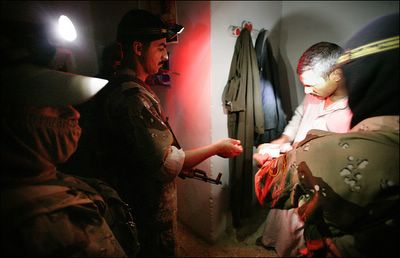
Christoph Bangert/Polaris, for The New York Times
Iraqi soldiers searching houses in Aleze were often greeted politely
April 6, 2005
MILITARY
New Iraqi Soldiers Gain Ground but Face Pitfalls
By JAMES GLANZ
ALEZE, Iraq, April 4 - When soldiers of the new American-trained Iraqi Army began banging on doors early on Monday to search houses in this village north of Baghdad, a surprising thing happened.
After initial expressions of fear or resignation, most Iraqis addressed the soldiers with traditional Arab greetings - peace be with you, God save you, welcome - and calmly let them in. The tension was clearly lower than it would have been had the Americans been there alone. Still, two raids in three days netted only 2 of 14 suspects sought in connection with a fatal attack on the Iraqi Army on Saturday, and little else.
The raids, in towns along the Diyala River, showed in stark terms both the advantages and pitfalls of handing over major security operations to Iraqis who have been trained, equipped and to some degree indoctrinated as soldiers by Americans.
Because these soldiers have been taught not to use the brutal tactics by which Saddam Hussein's army ruled, and because the insurgents still play by those old rules, the citizens are generally unwilling to pass information openly. So even though this army moves more easily among the population, it gets less real cooperation than it needs, said Col. Thaier Dhia Ismail Abid al-Tamimi, the commander of the Iraqi unit that was attacked Saturday.
"It is easy for Iraq to make security," said Colonel Thaier, who is familiar with the old methods firsthand, having worked as an intelligence officer in Mr. Hussein's army.
Colonel Thaier expressed staunch support for the new way of doing business, but he said the effort to combine security and democracy was making his job complicated.
Despite those problems, Colonel Thaier said, he has been finding an increasing willingness on the part of Iraqis to pass information secretly. In fact, the Iraqi Army unit that had been attacked in the area on Saturday, with one sergeant killed, was able to use its connections within the villages to identify likely attackers and draw up the list of 14 suspects.
Then, using techniques taught by their American trainers, the Iraqis put together an elaborate plan for the raid, which included a handful of American soldiers. The Americans backed them up in armored Humvees, and sometimes followed the Iraqis into houses.
"This one is based off their own intelligence, their own planning, their own execution," said Lt. Col. Roger Cloutier, commander of a unit in the Third Infantry Division that works closely with the Iraqi unit that was attacked, the 205th Battalion, in an area centered about 30 miles north of Baghdad near the city of Baquba. Colonel Thaier requested the Americans, said Colonel Cloutier, whose unit is under the overall command of the 42nd Infantry Division in Iraq.
Whatever the advantages of having Arabic-speaking soldiers operating in a community they know intimately, the raid suggested, the insurgents have adapted.
"It's too hard now to find the bad guys," First Lt. Mohammed Dhea Ahmed of the 205th Battalion said at 3 a.m., after hours of searching. "It was very easy in the past. You have to work hard."
Ahmad Flamars Favas, a Kurdish resident of Aleze, gave a typical response when asked where he thought the people involved in the attack on the army unit could be found. "I don't know," Mr. Favas said. "I swear on my home I don't know."
Colonel Thaier, the commander of the 205th, said in an interview before the raid on Monday that the local terrorists were "hidden in their houses in Miqdadiya," a town northeast of Baquba. Aleze is on the outskirts of Miqdadiya.
Roadside bombs and suicide bombs are still a daily problem here. The homegrown nature of the attacks make them much more difficult to stamp out, Colonel Thaier said, because the terrorists do not stand out as people from outside the town, and therefore can lie dormant as long as they like before striking.
Whatever the success rate of the operations, the shift to Iraqis conducting them holds some promise for easing a major problem: that house raids often aggravate resentment of the American-led occupation itself. On the Diyala River raids, most Iraqis seemed far more ready to accept Iraqi troops entering their homes, even if Americans followed.
"Yes, I welcome that," said Alaa Hamid Salmar, 40, the head of a household in Tel Sokhayr, a town on the Diyala River, when asked about the issue during a raid on Saturday.
"I feel much better when I see Iraqi forces," he said. "They know our traditions."
When asked if he would prefer to do without the intrusions altogether, Mr. Salmar objected, saying, "We don't mind if they search places like this, because we need security."
Colonel Thaier said that after the killing on Saturday, informants provided 14 names of people associated with the same terrorist cell despite the difficulty of getting residents to talk publicly.
Then, at 10:30 that night, the soldiers who would conduct the raid gathered in a huge, warehouse-style building with a projector at one end.
Capt. Curtis Burns, commanding the modest American contingent, talked with Iraqi commanders as a satellite map of the town to be raided was projected onto the wall. "Where do you consider to be the most dangerous area?" Captain Burns asked, largely accepting the advice of the Iraqis on where to place his forces.
Then, as Capt. Wahab Abid Ali of the 205th directed the proceedings through a microphone, his voice reverberating in the cavernous building, the Iraqis proceeded to undertake a rather crisp run-through of the operation.
And by 1:30 a.m., the Iraqis were knocking on doors and searching houses in the town. American soldiers sometimes followed the Iraqis in. A few Iraqis were surly at being awaked and disturbed, but most had welcoming words.
The searches were slow and painstaking, and a reporter with one Iraqi unit never saw them resort to smashing in a door or roughing up a homeowner on this night.
At one point a corpulent woman whispered to the Iraqi soldiers that her neighbor disliked Americans and spoke of having grenades. A search there turned up nothing, but the Iraqi soldiers were careful to come back and make a show of searching the woman's house as well, so that her neighbor would not suspect that she had spoken up. Two suspects, Tarik Said and Hazam Mohe, turned up during routine checks of identification cards, and by 4 a.m. they were kneeling and blindfolded, their hands bound behind their backs, by the side of a main road in Aleze. Questioned through an interpreter, Mr. Said said that he had an alibi and that he had been miles away from the shooting.
Mr. Mohe was more talkative, conceding that he knew there had been an attack, but saying that he had merely heard about it through friends. He said "strangers from outside" had carried it out.
The Iraqi gun trucks pulled away, followed by the American Humvees. Except for Iraqi soldiers smoking and joking as they guarded the detainees, the town was quiet.
Copyright 2005 The New York Times Company | Home | Privacy Policy | Search | Corrections | RSS | Help | Back to Top

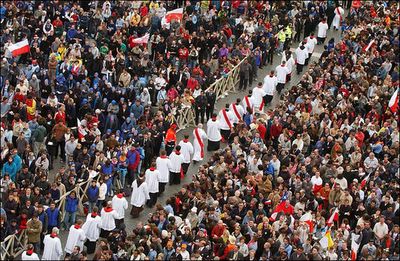
OP-ED CONTRIBUTOR
Our Near-Death Experience
By THOMAS LYNCH
Moveen, Ireland ? IMAGES of the papal wake dominated the news this week: the dead man's body vested, mitered, laid out among his people in St. Peter's Square, blessed with water and incense, borne from one station to the next in a final journey. Such images - along with the idea that millions of people would wait for hours merely for a chance to pass by the body itself - may have given pause to many Americans for whom the presence of the dead at their own funerals has become strangely unfashionable.
For many bereaved Americans, the "celebration of life" involves a guest list open to everyone except the actual corpse, which is often dismissed, disappeared without rubric or witness, buried or burned, out of sight, out of mind, by paid functionaries like me. So the visible presence of the pope's body at the pope's wake and funeral strikes many as an oddity, a quaint relic. How "Catholic," some will say, or how "Italian" or "Polish" or "traditional"; how "lavish" or "expensive" or "barbaric." Such things were said when Diana, Princess of Wales, died, and when Ronald Reagan did.
In truth, what happened in Rome this week, like what happens in Michigan or Manhattan or Mozambique when one of our own kind dies, is a deeply human event, unique to our species - this going the distance with our dead. Cocker spaniels do not bother with this, nor do rock bass, nor rhododendrons, nor any other thing that lives and dies.
But we do. Wherever our spirits go, or don't, ours is a species that down the millenniums has learned to deal with death (the idea of the thing) by dealing with the dead (the thing itself) in all the flesh and frailty of the human condition. We process grief by processing the objects of our grief, the bodies of the dead, from one place to the next. We bear mortality by bearing mortals - the living and the dead - to the brink of a changed reality: heaven or Valhalla or whatever is next. We commit and commend them into the nothingness or somethingness, into the presence of God or God's absence. Whatever afterlife there is or isn't, human beings have marked their ceasing to be by going to the tomb or the fire or the grave, the holy tree or deep sea, whatever sacred space of oblivion to which we consign our dead. Humans have been doing this for 40,000 years.
I've been doing funerals for almost 40.
I came up burying Presbyterians and Catholics, devout and lapsed, born again and backslid. Baptists, Orthodox Christians, an occasional Zen Buddhist and variously observant Jews. For each of these sets, there were infinite subsets. We had right old Calvinists who drank only single malts and were all good Masons and were mad for the bagpipes, just as we had former Methodists who worked their way up the Reformation ladder after they married into money or made a little killing in the market. We had Polish Catholics and Italian ones, Irish and Hispanic and Byzantine, and Jews who were Jews in the way some Lutherans are Lutheran - for births and deaths and first marriages.
My late father, himself a funeral director, schooled me in the local orthodoxies and their protocols as I have schooled my sons and daughter who work with me. There was a kind of comfort, I suppose, in knowing exactly what would be done with you, one's ethnic and religious identities having established long ago the fashions and the fundamentals for one's leave-taking. And while the fashions might change, the fundamental ingredients for a funeral were the same: there is someone who has quit breathing forever, some others to whom it apparently matters, and someone else who stands between the quick and dead and says something like "Behold, I show you a mystery" or "Do not be afraid" or "Goodbye."
Late in the last century more homegrown doxologies became more popular. We boomers, vexed by the elder metaphors of grief and death, wanted to create our own. Everyone was into the available "choices."
So we started doing more cremations - it made good sense. Folks seemed less "grounded" than their grandparents, more "scattered" somehow. "Bridge Over Troubled Water" replaced "How Great Thou Art." And if Paul's Letter to the Romans or the Book of Job was replaced by Omar Khayyam or Emily Dickinson, what harm? After great pain, a formal feeling comes, and rings as true as any sacred text. A death in the family is, as Miss Emily describes it: First - chill - then stupor - then the letting go.
Amid all the high fashions and fashion blunders, the ritual wheel that worked the space between the living and the dead still got us where we needed to go. It made room for the good laugh, the good cry and the power of faith brought to bear on the mystery of mortality. The broken circle within the community of folks who shared blood or geography or belief with the dead was closed again. Someone brought the casseroles, someone brought the prayers, someone brought a shovel or lighted the fire. Everyone was consoled by everyone else. The wheel that worked the space between the living and the dead ran smooth.
For many Americans, however, that wheel is not just broken but off track or in need of reinvention. The loosened ties of faith and family, of religious and ethnic identity, have left them ritually adrift, bereft of custom, symbol, metaphor and meaningful liturgy or language. Times formerly spent in worship or communion are now spent shopping or Web-browsing or otherwise passing time. Many Americans are now spiritual tourists without home places or core beliefs to return to.
INSTEAD of dead Methodists or Muslims, we are now dead golfers or gardeners, bikers or bowlers. The bereaved are not so much family and friends or fellow believers as like-minded hobbyists or enthusiasts. And I have become less the funeral director and more the memorial caddy of sorts, getting the dead out of the way and the living assembled for a memorial "event" that is neither sacred nor secular but increasingly absurd - a triumph of accessories over essentials, stuff over substance, theme over theology. The genuine dead are downsized or disappeared or turned into knickknacks in a kind of funereal karaoke - bodiless obsequies where the finger food is good, the music transcendent, the talk determinedly "life affirming," the accouterments all purposefully cheering and inclusive and where someone can be counted on to declare "closure" just before the merlot runs out. We leave these events with the increasing sense that something is missing.
Something is.
Just as he showed us something about suffering and sickness and dying in his last days alive, in death Pope John Paul II showed us something about grieving and taking our leave. The good death, good grief, good funerals come from keeping the vigils, from bearing our burdens honorably, from honest witness and remembrance. They come from going the distance with the ones we love.
Thomas Lynch, a funeral director, is the author of "The Undertaking" and the forthcoming "Booking Passage: We Irish and Americans."
Copyright 2005 The New York Times Company | Home | Privacy Policy | Search | Corrections | RSS | Help | Back to Top

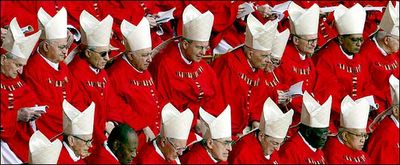
Olivier Hoslet/European Pressphoto Agency
All but 3 of the more than 100 electors were selected by John Paul, making it unlikely that the new pope will depart from John Paul's conservatism.
Cardinals Say Pope Must Be Communicator
By LAURIE GOODSTEIN and DANIEL J. WAKIN
ROME, April 9 - The Roman Catholic Cardinals will take an oath of secrecy when they enter the conclave to elect the next pope, but in the week since John Paul II's death many have been publicly dropping hints about what kind of man the church now needs.
The enormous outpouring of affection for John Paul has clearly had an impact on their thinking. Many of the prelates said in noticeably similar language that while the next pope may have a very different style than John Paul, he must above all be an effective communicator of the faith who can sustain the grass-roots enthusiasm, especially among youth, that John Paul generated.
With all but 3 of the 117 cardinal electors selected by John Paul, it is highly unlikely that the new pope will depart from his conservatism on contraception, divorce, women as priests or the range of what the church considers to be "sanctity of life" issues, from stem cell research to abortion and euthanasia.
Before the pope's death, many cardinals and commentators said a decisive factor could be geography - whether the next pope should come from Europe, where the church is shrinking, or from Latin America, Africa or parts of Asia, where the church is experiencing rapid growth.
But since the pope's death, the cardinals have said they are looking for someone who can project universal appeal with a personal humility and pastoral presence that embodies the message of the gospel, as they say John Paul did. It is not, many cardinals said in interviews, that they must choose a great orator.
"He doesn't have to be John Paul II and have the same fingerprints," said Cardinal J. Francis Stafford, formerly the archbishop of Denver and now a high-ranking Vatican official. "He just has to be his authentic self," Cardinal Stafford added. "And if they see he's authentic, that he's honest and they will see that that's all they need. He will lead them to Christ, and that's all that's necessary."
Cardinal Stafford and others spoke before Saturday, when the Vatican spokesman, Joaquín Navarro-Valls, announced that the cardinals had decided unanimously at their daily meeting "to avoid interviews and contact with the media," whose members were "invited to abstain" from seeking out comment.
"The cardinals have begun a period of more intense silence and prayer in the face of the conclave," he said. The conclave begins on April 18. Two cardinals cannot attend for health reasons, bringing the total count of electors to 115, the Vatican said Saturday.
The men who will elect one of their own to be the leader of a church of more than a billion people are the most ethnically and geographically diverse college of cardinals in history, thanks to the effort by John Paul to increase the number of non-Italians. Twenty-one come from Latin America, one of the world's fastest-growing Catholic zones, giving it one more than the traditional power, Italy. The United States and Canada have 14; Africa and Asia each has 11; Europe, where in some countries the church is hemorrhaging the faithful, has 58. The youngest is 52 years old; the oldest turns 80 in June.
They fall into two groups: those who work in the Vatican curia, carrying out the business of the church, and those who serve as archbishops, tending to Catholics on the local level.
Aside from age and geography, they also have different priorities for the next pope to emphasize as he carries out his public ministry.
One is the need to continue forging closer ties with other religions and other Christian denominations. Many cardinals emphasized last week the need for increased dialogue with Muslim leaders. "You don't want a clash of religions," said Cardinal Avery Dulles, a theology professor at Fordham University and a nonvoter. He identified ecumenism as one of two priorities for the next pope along with pushing forward with John Paul's effort to evangelize in the West.
Several cardinals have indicated a strong desire for someone with the pastoral qualities of cardinals who are also archbishops.
"I would hope his focus would be on local communities of faith," Cardinal Edward M. Egan of New York said. "The parish is the central unit that must be served."
More than at any past conclave - the closed door meeting in the Sistine Chapel where the cardinals will vote - this one has an unusually large number of "papabili," the Italian word to describe those with pope potential.
The cardinals are loath to mention names, but from the comments of many, the field seems to be wide open.
But by describing the qualities they desire, educated guesses can be made about serious contenders, always with the often-repeated caveat about conclaves, "go in a pope, come out a cardinal."
One man who fits many of the current criteria is Cardinal Dionigi Tettamanzi, 71, the archbishop of Milan. He reminds many Italian Catholics of an earlier much-beloved pope, John XXIII, with his plump appearance and his warmth. He is a son of the working class, and spoke in support of antiglobalization protesters in 2001 at the meeting of major industrialized nations in Genoa, where he told the thousands of demonstrators, "One African child sick with AIDS counts more than the entire universe."
He is also a conservative intellectual, close to Opus Dei, who is said to have helped John Paul write several key encyclicals. He has published a book on bioethics, an expertise that would be crucial for the next pope.
Another whose name is often mentioned is Claudio Hummes, the archbishop of São Paulo who speaks five languages and looks much younger than his 70 years. Brazil has the largest number of Catholics of any country, but the church is facing a serious challenge from the Protestant evangelical movement. As a bishop early on, he opposed Brazil's military government and backed striking workers. Since then, he has grown more conservative and once chastised a priest for suggesting that condoms should be used to fight AIDS.
Even before the conclave, candidacies will be pushed by what are known among Vatican watchers as Grand Electors - influential cardinals who can sway votes or at the least are looked to for guidance. They tend to be prominent members of Vatican congregations where they meet other cardinals, or frequent travelers, or men who by sheer force of intellect and personality are given weight. Some of them are even papabili themselves.
The issues on the minds of Catholics who would like to see their church liberalize its position on contraception, divorce or women priests are not under discussion, the cardinals said in interviews. This does not preclude the possibility that the next pope could eventually lead the church to adopt some new interpretation on church traditions, but where the issue is considered a matter of doctrine it is highly unlikely to change.
For instance, the church's ban on artificial contraception was reinforced by Pope Paul VI in his encyclical Humanae Vitae.
A reporter asked Cardinal Francis George of Chicago in a news conference last week whether the church would consider approving the use of condoms to prevent AIDS in places like Africa.
"Your solution is to exterminate the poor?" he said, referring to the births that contraception would prevent. "The doctrine of the church isn't going to change, and so you work with it as best as you can."
Despite the growing consensus that they need a communicator, there is always a chance that other factors will significantly sway the cardinals' choice.
They may opt for an older interim figure, someone who would help the church pause for breath in the aftermath of one of history's longest and most eventful papacies. A candidate for that role would be Cardinal Joseph Ratzinger, who worked closely with John Paul for 24 years as the chief overseer of church theology and is deeply respected for his learning and decisiveness. He is also the dean of the cardinals, effectively their chairman and guiding force, and is one of only three cardinal electors who have ever attended a conclave.
But age may hurt. Cardinal Ratzinger turns 78 on Saturday. "This is a very strong personality, of great intelligence, faith and openness," Cardinal Zenon Grocholewski told Reuters. "The problem is his advanced age."
Perhaps a young, vigorous man would be attractive, after so many years of the world seeing an increasingly ailing John Paul.
The Viennese archbishop, Christoph Schönborn, 60, fits that bill. He is the fourth youngest of the cardinals, widely respected for being learned and articulate.
The scion of an aristocratic family with numerous clerical members over the centuries, Cardinal Schönborn is well-thought of for how he handled the sex scandals that shamed his predecessor. But some fault him for showing coldness in handling his staff and for reacting poorly to a dispute with another Austrian bishop. He belongs to the Dominican religious order.
Then there is region: should he come from a developing country? Perhaps, this line of reasoning goes, the timing would be perfect for a pope to address poverty, just as the cold war demanded a Karol Wojtyla.
"I believe the Holy Spirit will give us the pope we need at this time, like he did 26 years ago, when John Paul II was elected," Cardinal Theodore McCarrick of Washington said.
Francis Arinze, 72, of Nigeria, who is also heavily involved in relations with Muslims, is a perennial favorite.
Cardinal Arinze has been a Vatican official for 20 years, and is head of the department regulating worship and the sacramental practice. He converted to Catholicism at the age of 9. While his spiritual credentials are strong, critics have said he lacks imagination. His language can be strong. A year ago he said that a Roman Catholic politician who supports abortion "is not fit" to receive communion, and he has criticized homosexuality as having "mocked" the family.
Perhaps none of this matters, some cardinals suggested, returning to the charisma issue.
If they ever needed proof of the power of a single figure to inspire Catholics, particularly young ones, they had it last week. The image of the crowds that came to mourn John Paul - an estimated 1.4 million filed by the pope's body among the roughly three million who descended on Rome - is prompting the cardinals to wonder how to sustain and deepen that enthusiasm and even translate it into a reinvigorated church.
"He has to be able to communicate with rich, young people in countries like the United States and France," said Cardinal Philippe Barbarin of France. "Then he needs to be able to relate to the poor when he goes to places like Brazil or Morocco or Burkina Faso. He has to be a person who can explain the Gospels to every type of audience.
"He has to really love his flock; he has to understand their sufferings, their difficulties," he said.
"John Paul II was that kind of pope."
Copyright 2005 The New York Times Company | Home | Privacy Policy | Search | Corrections | RSS | Help | Back to Top

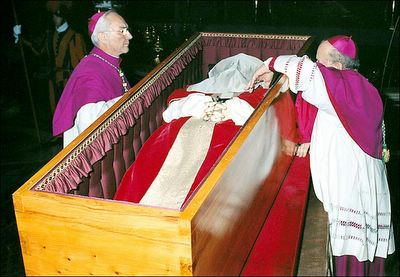
Osservatore Romano
Before the public funeral Mass, Archbishop Stanislaw Dziwisz placed a veil over Pope John Paul II's face.

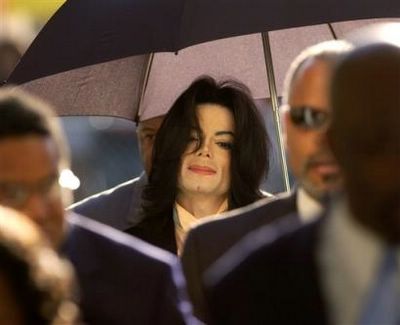
Michael Jackson and his entourage make their way to the Santa Barbara County courthouse in Santa Maria, Calif., Friday, April 8, 2005, for Jackson's child molestation trial. (AP Photo/ Aaron Lambert,pool)
Witnesses in Jackson Case Surprise Lawyers
By TIM MOLLOY, Associated Press Writer
SANTA MARIA, Calif. - They may not be as unpredictable as Michael Jackson, but witnesses in the singer's child molestation case have surprised lawyers on both sides with unexpected testimony.
Flight attendant Cynthia Bell had been expected to testify this past week that Jackson shared wine with his young accuser on an airplane trip ? but she said no such thing.
Bell testified she served Jackson wine in a Diet Coke can but did not see the boy drink from it.
Prosecutors also thought Jesus Salas, the pop star's former house manager, would say he served wine to Jackson and several boys. But on the witness stand, Salas suddenly remembered he had also brought soda for the boys.
Jackson, 46, is on trial on charges of molesting a 13-year-old boy at his Neverland ranch in 2003, and one of the counts alleges he plied his accuser with alcohol, but the testimony left prosecutors with no direct evidence to prove that allegation.
"The DA's come up empty-handed," said Jim Hammer, an analyst at Fox News and a former San Francisco prosecutor. "You shouldn't be surprised by your own witnesses."
The Jackson case has seen an unusual number of people change key aspects of their testimony or say something unexpected, said Loyola Law School professor Laurie Levenson. It could be a sign that prosecutors are overwhelmed by the number of witnesses or by how quickly the case went to trial, she said.
"When you do last-minute preparation, you're more likely to have surprises," Levenson said.
Defense attorneys also have faced unexpected testimony. They had hoped comedian George Lopez would say the accuser once tried to con him out of $300 by claiming that Lopez took money from the boy's wallet. During testimony, however, Lopez accused the boy's father of orchestrating the scheme.
Prosecutors have occasionally looked frustrated as their witnesses strayed.
Jackson's accuser told a grand jury last year that the pop star once appeared nude in front of him and his brother and told them it was "natural."
But while testifying last month, the boy did not initially recall the statement. When prosecutor Tom Sneddon pressed the boy, asking if he recalled what he told the grand jury, defense attorney Thomas Mesereau Jr. accused Sneddon of coaching the witness.
"I agree," Superior Court Judge Rodney S. Melville said.
"I can't refresh his memory?" Sneddon asked.
"Not if he says 'I can't recollect,'" the judge said.
"I can't recollect," the boy said.
Eventually, the boy was allowed to review his grand jury testimony and then said he remembered Jackson making the statement.
Several witnesses testified that they met with prosecutors only a day or two before taking the stand, suggesting they had little time to review earlier statements to sheriff's investigators, grand jurors or during lawsuits.
Salas seemed to catch prosecutor Gordon Auchincloss off guard when asked if he had served wine to Jackson and children. The former house manager said he did bring wine but also had brought soda for the children.
"When you talked to the Sheriff's Department about this, you never mentioned anything about any soda," Auchincloss said.
"It just flipped into my mind right now," Salas testified
